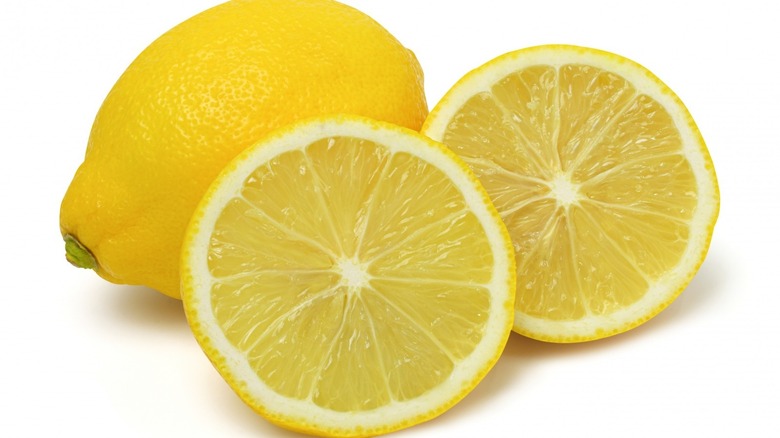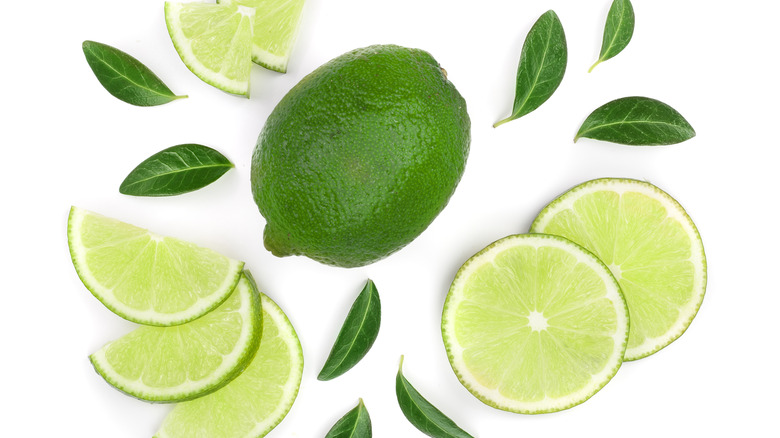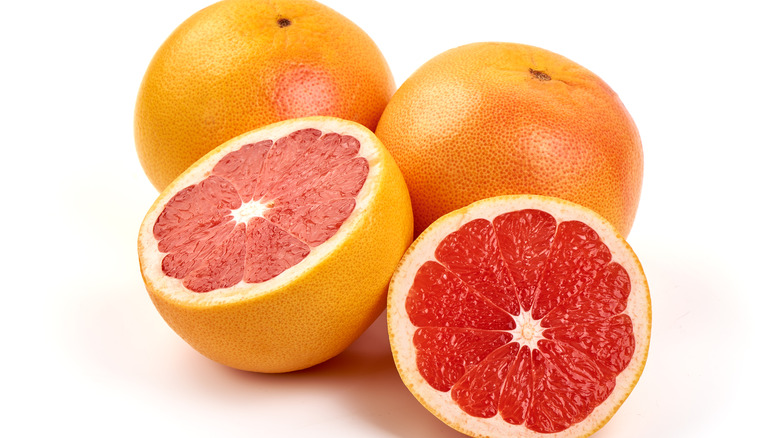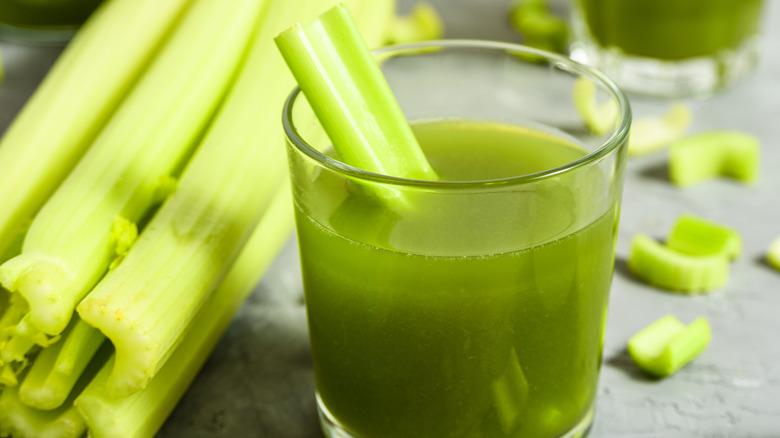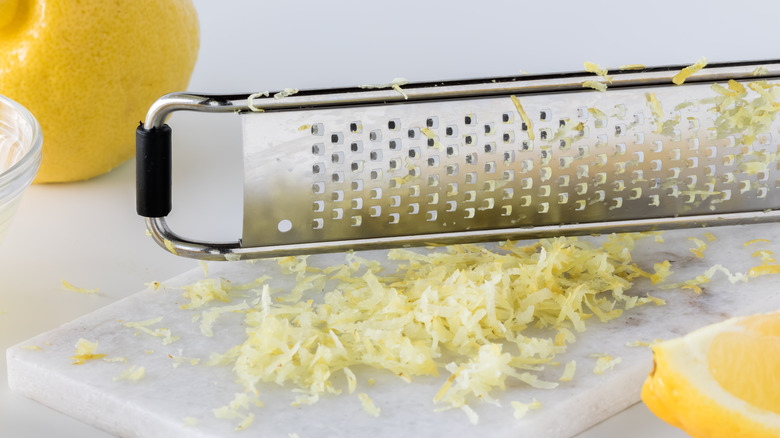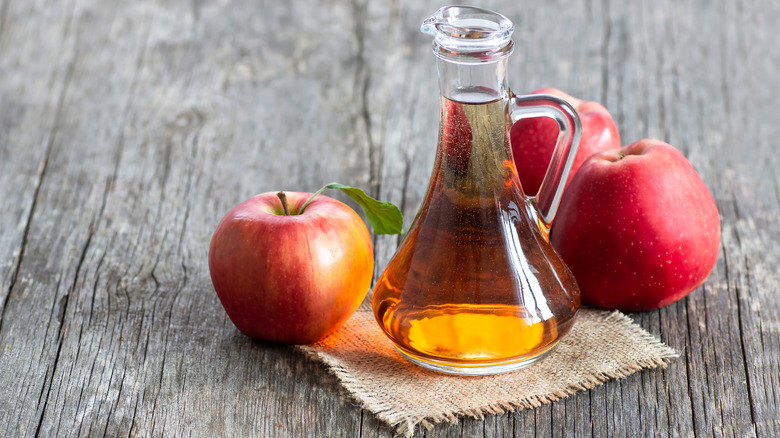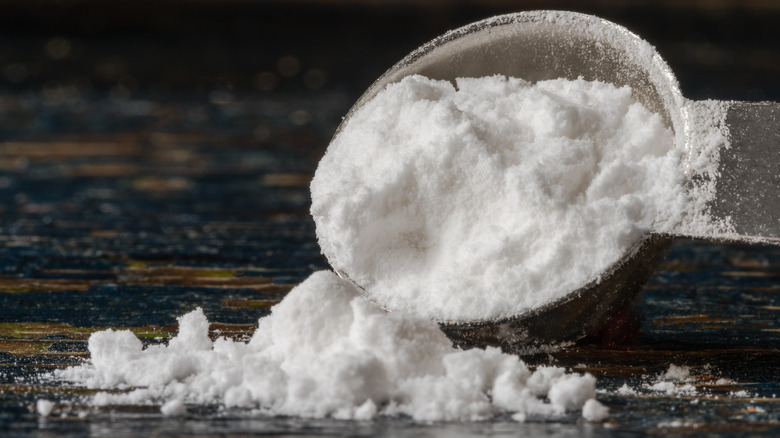10 Best Substitutes For Lemon Juice
The look of a lemon is truly deceiving in its simplicity. What seems like a run-of-the-mill citrus fruit is, in fact, a chef's best friend with a myriad of uses. And, whether you grate its rind for an extra citrus kick or slice it up to decorate your favorite mocktail, the lemon's juice is its most coveted feature.
The citrus staple pairs well with so many dishes that it has proven itself indispensable to chefs and home cooks alike. Not only does it add some zip to cooked veggies, but it also provides a dash of lemony flavor to chicken, seafood, and fish. It's a welcome addition to berry-based muffins, cookies, and pancakes; it's the key ingredient in lemonade, lemon loaf, and lemon meringue pie; it's the secret behind many salad dressings and sauces; and it transforms traditional fare like mayonnaise, tea, ice cubes, and tap water into something much more exciting.
This trusty yellow orb is also a great sanitizer and deodorizer. Its juice will make even the most onion-smeared cutting board smell better, de-stink the most neglected microwave, cut through the grease on your dishes, add a sunshiny sparkle to your pots and pans, and descale your well-used kettle. Yes, it seems that the invaluable lemon is simply irreplaceable. Or is it? It turns out that there are things you can use when you simply don't have this citrus gem on hand. Here are our top 10 picks.
1. Lime juice
The most obvious choice to serve as lemon's understudy would be its green cousin, the lime. Lime juice has a similar pH level and can be used on a 1:1 ratio, making it one of closest things you can get to the juice of an actual lemon.
While there are slight differences in flavor — the lime being somewhat less tart — the difference in many dishes will be negligible. Nigella Lawson points out that limes only yield about two tablespoons of juice while lemons produce four tablespoons, so you will need to purchase twice as many limes to get the same amount of liquid.
Limes make excellent substitutions for their yellow counterparts in seafood, grilled meats, cooked vegetables, and salad dressings. Instead of lemon loaf or lemon meringue pie, you can whip up lime varieties just as easy. They can also be used to create some of your favorite cocktails.
Like lemons, limes can be used for descaling, removing odors, and sanitizing around the home, too. Just remember, they don't cover the same distance as lemons, so you'll need quite a few extra to get the same amount of juice.
2. Dry white wine
While you likely won't want to attempt any cleaning tasks with a bottle of your favorite dry white wine, you can use it as a lemon substitute in several dishes — especially savory ones. Use half the amount of wine as you would lemon juice in your recipe, however. Some of the best foods for swapping out lemons for wine include chicken, fish, seafood, pasta, and pork. Unfortunately, it will not work in dishes that rely heavily on the lemon flavor like lemon chicken, lemon risotto, or most other things that start with the word "lemon." This also rules out dessert items and lemon-based cocktails.
It's also important to stick to dry white wines as they have the acidic qualities found in a lemon and won't add unwanted sweetness to your fare. The most recommended varieties include sauvignon blanc, pinot grigio, vinho verde, and a good Chardonnay as a back-up plan. With this swap, you get the added bonus of having something to sip on while you toil in the kitchen, too.
3. Orange juice
Another member of the citrus fruit family that can step in for its sunshine-hued cohort is the orange. While this fruit is sweeter and less acidic than the lemon, it will work in recipes that don't require a great deal of lemon juice. Yes, if you put it in lemon loaf, it will become an orange loaf. But, if you use it in a savory recipes that calls for a hint of lemon like a seafood, fish, or chicken dish, the orange juice will work wonders. It can also make a great addition to your homemade dressing. You may even find that you enjoy the slightly less tart flavor.
Ideally, you will use a 1:1 ratio when replacing lemons with oranges, but keep in mind that oranges do contain more sugar so you'll want to adjust accordingly. But, on the upside, you are more likely to have an orange hanging around the house than some of the other lemon substitutes in this list.
4. White vinegar
When it comes to adding radiance to your pots and pans and faucets, the trusty lemon can easily be replaced by good old white vinegar. It can remove bacteria from your cutting board, make your silverware sparkle, remove even the slipperiest grease from your stovetop, and fight nostril-affronting odors. But can vinegar step in for lemon juice when it comes to cooking duties?
It turns out that standard white vinegar can replace lemon juice if only a very small amount is required, particularly in baking. It does, after all, possess that same papillae-puckering bitterness and a high level of acid. Just remember, it does have a highly potent fragrance and an equally strong taste, so less is definitely more with this sub. The ratio recommended by Tastes Better From Scratch is 1/2:1, so if your recipe calls for a teaspoon of lemon juice, replace it with just a half-teaspoon of vinegar. And remember, if the lemon is the star of a dish, vinegar is not a suitable replacement. No one wants to chow down on vinegar meringue pie, after all.
5. Lemon extract
Using lemon extract in place of lemon juice may, on the surface, seem like a no-brainer. The reality, however, is that extracts possess a highly concentrated flavor, so you must resort to using these with caution. When replacing lemon juice with lemon extract, it is best to use half the amount of extract and substitute the remaining amount with water, per Our Everyday Life. So, if the recipe requires a tablespoon of lemon juice, you would need to use a half-tablespoon of extract and a half-tablespoon of water.
Unlike several of the other possible lemon juice substitutions in this list, lemon extract is best used when the lemon flavoring is the star of the show, like lemon bread, lemon pie, or lemon bars. The extract's potent taste will give these dishes an extra lemony pop. It does not, however, possess the same acidity as lemon juice, so it does not make a good alternative when baking — particularly in recipes that rely on baking soda to rise.
6. Grapefruit juice
It wouldn't seem fair to include other members of the citrus family without making mention of the lemon's heftier relation — the grapefruit. Like lemon's other close kin, the grapefruit should be used on a 1:1 ratio as it has similar levels of tartness. Grapefruit contains much more juice than lemons, however, so it's important to keep this in mind if a recipe asks for the juice of one lemon. Most sources purport that there are 4 tablespoons of juice in a medium lemon, so this is all you will need to squeeze from your grapefruit.
Again with this substitute, it is not recommended to use a grapefruit in dishes that rely heavily on a lemony taste. Lemon pound cake, lemon Italian ice, and lemon curd would be unrecognizable if you were to make them with grapefruit.
And, on a very important note, people on some medications cannot ingest grapefruit at all. This seemingly benign fruit contains an enzyme that causes too much of certain drugs to be absorbed, completely altering how they work. If you are planning to cook for company, make sure that your guests are able to consume grapefruit safely.
7. Celery juice
Over the past couple of years, celery juice has enjoyed a sizable increase in popularity. With many espousing its remarkable health benefits, such as possible cancer-fighting antioxidants, properties that aid in digestion and may reduce inflammation, the possible ability to lower cholesterol and blood pressure, and boasting a bevvy of minerals and vitamins (per Feasting At Home), shoppers have been buying up these green stalks at an alarming rate. After all, who wouldn't want to include all of these things in their diet?
If celery juice doesn't have enough to brag about, it can also step in for lemon juice when you're in a bind. Much less bitter than its citrus counterpart, it does deliver the same degree of freshness, which is what many enjoy. Replacing lemon juice with celery juice should be done on a 1:1 ratio, making this a super easy substitution as well.
Just remember, this is not a great alternative when a strong citrus flavor is required. Lemon desserts, lemon drinks, and other dishes that truly showcase the bright yellow fruit will be sorely lacking — or downright disgusting — with celery as the star player. And you don't want to disappoint your devoted citrus lovers you invite for dinner.
8. Lemon zest
If you wish to capture the strong flavor of lemon, but don't have enough of the brightly-hued fruit on hand, you can opt for its zest instead. Yes, when it comes to grated lemon peel, it doesn't take much to make a dish extra lemony. And whether you have a lemon zester or are using a traditional grater, it doesn't take long to yield a decent stack of delectable rinds.
The recommended ratio of lemon zest to lemon juice is 1/2:1, and note you will need to make up the difference with water as lemon zest lacks the moisture of lemon juice.
Due to its highly concentrated flavor, lemon zest is best used in dishes that require a strong lemon presence. It works especially well in things like lemon bread, lemon cake, lemon chicken, and lemon curry. Its gritty texture does not lend itself well to lemon beverages, however. And, if you're baking, remember to make up the difference in liquid. There is nothing worse than rock-hard lemon loaf!
9. Apple cider vinegar
For those who want a substitute for lemon juice in order to do some household cleaning, apple cider vinegar can tackle many of the same jobs as its sibling. It can battle bacteria, remove mildew from your shower, combat microwave odors, take away soap scum, remove mineral-buildup on your drinkware, and clear clogged drains. Yes, trusty cider vinegar is ready, willing, and able to tackle your home's most disgusting jobs.
This demure bottle of magic can also step into lemon juice's shoes in several recipes as well. Like lemon juice, it offers diners a degree of tartness. And it can be substituted with ease, calling for a 1:1 ratio.
As an added benefit, many who suffer from acid reflux and heartburn after having lemon juice may find that apple cider vinegar is a pain-free alternative. It is important to note that due to its lack of citrus, ACV does not suit dishes that showcase a lemony flavor. This honey-colored vinegar is best used in recipes that are simply looking for a bitter note with a hint of sweetness like certain risottos, stews, and marinades.
10. Cream of tartar
Cream of tartar, otherwise known as "potassium bitartrate" in the scientific community, is a handy-dandy item that bakers can't do without. It is the master of the meringue, angel food cakes, chiffon, and a host of other baked treats. And, now, it can add lemon juice substitute to its list of skill sets.
It may not be able to mimic lemon's bitter or citrus notes in savory dishes, but it can react with baking soda in the exact same way as lemon juice, causing your concoction to rise. This makes it a lifesaver when you've run out of lemon juice, but need to whip up a favorite dessert. The recommended ratio is 1/2 a teaspoon of cream of tartar for 1 teaspoon of lemon juice.
